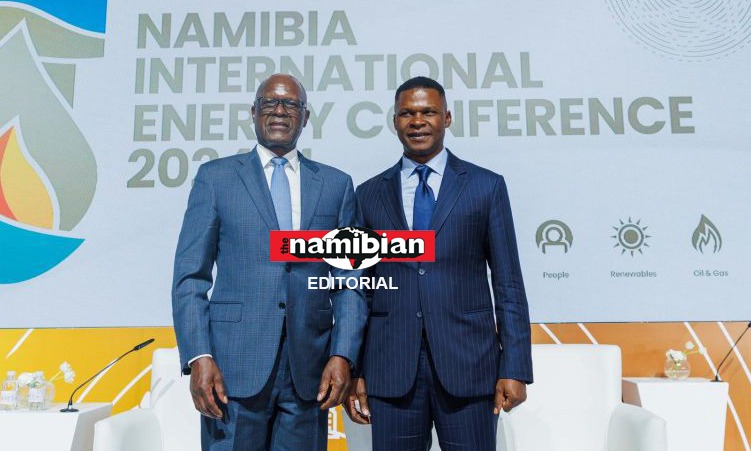Energy minister Tom Alweendo was spot on in cautioning Namibian business people not to expect handouts when oil production starts (in 2029 perhaps).
“First and foremost, let us not create any sense of entitlement, a ‘you owe me’ attitude,” Alweendo told the Namibia International Energy Conference in Windhoek this week.
“Nobody ‘owes’ us anything, so do not expect to receive handouts on a silver platter. No one is going to hand you projects and jobs just because you are a Namibian. You need to be ready, collaborate and compete.”
The conference, as Alweendo noted, is “a private sector-led event that brings people together to collaborate in meaningful conversations that might not otherwise have happened”.
Elite oil players internationally and locally pay thousands of dollars to attend it. In essence, those who can afford to attend influence government laws and policies.
It is noteworthy that the Namibian event and similar conferences around Africa have been led by people flagged as part of networks of corrupt oil producers. Cameroonian NJ Ayuk and his organisation African Energy Chamber are the strategic partners of the Namibia conference.
Ayuk has also been advising the Ministry of Mines and Energy on industry regulations, especially policy on ‘local content’, which refers to laws and policies meant to ensure that Namibians participate in businesses linked to oil production.
Another questionable person reportedly offering oil and gas legislation advisory services to Namibian authorities is James Jay Park, the Canadian mastermind behind ReconAfrica’s controversial oil exploration in the Kavango.
Some international reports have pointed to a pattern followed by Park, dubbed ‘The Oil Kingmaker’: Advising governments and then setting up advisory companies in the same country, thereby benefiting directly from oil regulations he helped draft.
Ayuk, who reports say was convicted of fraud in the United States, recently published an article urging Namibian members of parliament to pass laws promoting ‘local content’. Missing from his article is a commitment to good governance and zero tolerance on corruption.
Bad administration and corruption have turned oil and gas (great money-spinners) into a curse for countries like Equatorial Guinea, Nigeria, Angola, South Sudan and Sudan.
While Alweendo is right to urge oil companies to ensure the involvement of Namibian business and developing expertise, good intentions such as ‘local content’ are often hijacked by the corrupt for the self enrichment of the elite and their international cronies.
Namibia should have learnt its lesson from the costly fishing industry debacle, which was hijacked by a few politicians, their families and close friends in the name of ‘Namibianisation’. Need we mention Fishrot?
So far, the government has paid lip service by claiming commitment to ‘international best practices’, while giving a cold shoulder to calls to adopt and adapt existing initiatives like corrupt practices laws and transparency measures.
There is not a publicly available plan or engagements, to safeguard expected oil revenue.
Besides, what has the government done to prepare Namibians for ‘local content’ beyond preaching to cronies at decision-maker events?
What is being done to avoid The Dutch Disease as Norway has done successfully?
Instead, we are keeping close company with those who have done poorly, deliberately.
Angola and Nigeria can teach us about blatant corruption; the oil business has driven up the cost of living – goods (even food) housing, travel, tourism and exports are out of the reach of most citizens.
Oil and mineral rich Angola and Equatorial Guinea lag Namibia on key development indicators, because the resource windfalls are not used to serve the general public. Infant and maternal mortality rates in Angola and Equatorial Guinea are much higher than Namibia’s, as oil money gets stolen by the ruling and business elite.
For example, some statistics show the poverty risk is 17% in Namibia, 32% in Angola and 77% in Equatorial Guinea, whose population is about half ours.
Let’s learn from the likes of Norway (and the Gulf states) who embraced an upright Iraqi geologist, Farouk al-Kasim, to help them manage their windfall discovery.
But, pointedly, it starts with having the will to set the right culture of ensuring that the resources serve the masses rather than enrich a few.
We hope Namibian government leaders will take the right steps. But we will not hold our breath until they internalise the adage: “Show me your friends and I’ll tell you your future.”
Stay informed with The Namibian – your source for credible journalism. Get in-depth reporting and opinions for
only N$85 a month. Invest in journalism, invest in democracy –
Subscribe Now!






